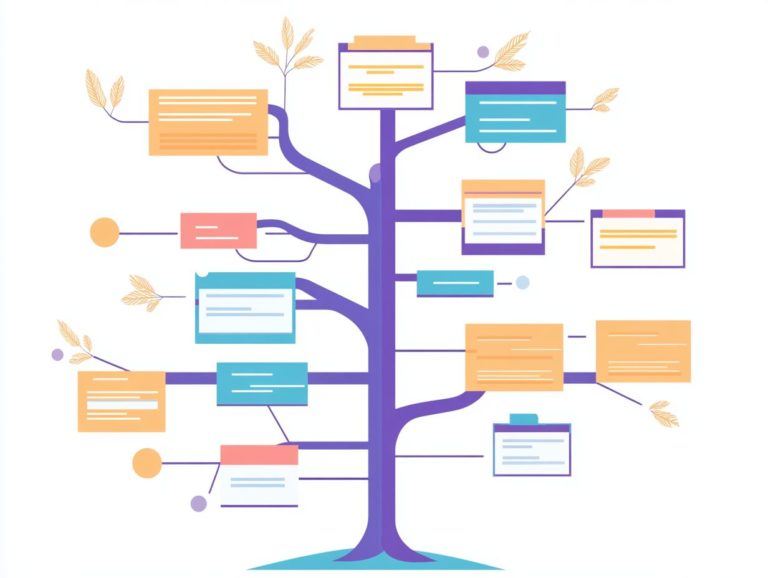5 effective project management techniques
Effective project management is vital for ensuring the success of any initiative, no matter its size or scope.
This article delves into five essential techniques that can significantly enhance your project outcomes. From clear communication and goal setting to detailed planning and effective risk management, each element plays a pivotal role in navigating the complexities of your projects.
You ll explore common challenges, the adaptability of these techniques for various project types, and how technology, along with key skills, can further streamline your processes.
Jump in now to unlock the secrets of effective project management and boost your skills!
Contents
- Key Takeaways:
- 1. Clear Communication and Goal Setting
- 2. Detailed Project Planning
- 3. Regular Progress Tracking and Reporting
- 4. Efficient Resource Management
- 5. Risk Management and Contingency Planning
- How Can Project Management Techniques Improve Project Success?
- What Are the Key Elements of Successful Project Management?
- How Can Project Management Techniques Be Adapted for Different Project Types?
- What Are the Common Challenges in Project Management and How Can They Be Overcome?
- How Can Technology Aid in Project Management?
- What Are the Key Skills Required for Effective Project Management?
- Frequently Asked Questions
Key Takeaways:

Good project management needs clear communication and goal setting. This helps everyone on the team work together toward the same goal. Detailed planning is crucial for success as it helps identify potential roadblocks and ensures all tasks are completed on time and within budget. For those looking to improve their approach, implementing 5 ways to enhance project visibility can be beneficial. Regular progress tracking and reporting allows for early detection of issues and enables timely adjustments to keep the project on track.
1. Clear Communication and Goal Setting
In successful project management, clear communication and precise goal setting are the cornerstones of effective collaboration. This ensures that every team member aligns with the project goals and stakeholder expectations, ultimately leading to a higher rate of project success and satisfaction.
By incorporating tools like project management software and instant messaging platforms, you can foster an environment where information flows seamlessly, minimizing misunderstandings and delays.
Using goal-setting techniques such as SMART (Specific, Measurable, Achievable, Relevant, Time-bound) objectives helps ensure that everyone understands their roles and responsibilities.
Regular check-ins and updates not only aid in tracking progress but also reinforce accountability. These strategies keep stakeholders informed and enhance collaboration by making sure all voices are heard and aligned toward common aspirations.
2. Detailed Project Planning
Detailed project planning is essential in project management. It helps you define the project scope, allocate resources, and establish realistic deadlines.
This approach helps each team member understand their roles in the project. Clear roles lead to better collaboration.
By breaking down the project scope into manageable tasks, effective planning helps mitigate potential risks and aligns the team toward shared goals.
Resource allocation is equally crucial; it s not just about assigning personnel but also about securing the necessary tools and managing budgets.
Creating a timeline that highlights key milestones facilitates tracking progress. Using project management tools like Trello, Asana, and Microsoft Project helps organize these components effectively.
3. Regular Progress Tracking and Reporting
Regularly tracking progress and providing comprehensive reports are essential for maintaining visibility into your project timelines. These practices equip you with valuable insights for knowledge-based decision making and strategic adaptations necessary for achieving your desired outcomes.
By employing methods such as Gantt charts, Kanban boards, and digital project management tools, you can enhance your ability to monitor progress effectively. Additionally, understanding 5 ways to handle project scope creep is crucial for staying on track. As a project manager, you’ll often rely on key performance indicators (KPIs) to assess development and ensure you’re meeting your objectives.
Equally vital is engaging stakeholders through regular feedback sessions. These interactions not only guide crucial decisions but also allow you to adapt the project s direction based on real-time insights. This iterative process fosters collaboration, ensuring that your project outcomes align closely with stakeholder expectations and ultimately lead to greater success.
4. Efficient Resource Management

Efficient resource management is crucial for project success. It ensures that your resources time, budget, and personnel are used effectively.
This strategy helps meet deadlines and reduces possible risks. Use detailed budgeting methods and monitor finances regularly.
Tools like Gantt charts help visualize timelines, while Kanban boards track tasks. Software solutions like Trello or Microsoft Project streamline communication and help track performance.
By adopting these methods and understanding the 5 reporting metrics every project manager should know, you’ll make better decisions and implement quick adjustments to drive your project’s success.
5. Risk Management and Contingency Planning
Managing risks and planning for emergencies are key to overcoming project challenges. These practices empower you to create strategies that meet stakeholder expectations.
By identifying risks like budget overruns or resource shortages, you can assess their likelihood and impact. For example, launching a new product may involve risks related to market acceptance or production delays.
Address these concerns with proactive measures like market research and building strong supplier relationships. Having backup plans, such as alternative funding or suppliers, helps you adapt effectively.
This approach keeps your teams agile and ready for uncertainties, paving a smoother path to success.
How Can Project Management Techniques Improve Project Success?
Project management techniques, like Agile, Waterfall, and Scrum, enhance project success. Additionally, utilizing task management tools for construction projects can streamline processes, optimize resource use, and address stakeholder needs effectively.
Choosing the right methodology aligns your strategies with project requirements. Agile is ideal for dynamic environments, allowing teams to deliver quick improvements.
Waterfall works well in projects needing clear structure, like construction. Scrum emphasizes collaboration and feedback, perfect for teams seeking flexibility.
Understanding these methods gives you the power to tailor your approach, ensuring all stakeholders feel engaged and satisfied.
What Are the Key Elements of Successful Project Management?
Successful project management involves effective communication, well-defined goals, a dedicated team, and utilizing task management tools to boost team efficiency for timely delivery of project outcomes.
These components work together to influence your project s path. Effective communication keeps all stakeholders aligned and informed.
When combined with clear goals, this forms a roadmap guiding your team to important milestones. Collaboration within the team boosts productivity and sparks innovation.
Ultimately, these efforts lead to high-quality, timely outcomes, reflecting a strong commitment to excellence.
How Can Project Management Techniques Be Adapted for Different Project Types?

Adapting project management techniques is essential for overcoming unique challenges. Whether you use Agile methods, which allow for flexibility and quick adjustments, for iterative projects or prefer Waterfall for linear processes, selecting the right approach is crucial. Additionally, utilizing 5 effective task management tools for academic projects can further enhance your project management strategy.
Each strategy has strengths and weaknesses. Agile is excellent for software projects because it enables teams to respond quickly to changing needs.
In contrast, the Waterfall method excels in construction, where a clear sequence like design and build ensures careful planning and reduces risks.
By understanding these methods, you can foster better communication, enhance collaboration, and ultimately drive project success across various industries. For those seeking practical solutions, exploring 5 task management tools for non-techies can be particularly helpful.
What Are the Common Challenges in Project Management and How Can They Be Overcome?
Common challenges in project management, such as navigating project risks, maintaining stakeholder relationships, and ensuring effective communication, can significantly hinder your project’s success. Often, these obstacles stem from a lack of clarity in objectives or misunderstandings among team members, leading to delays and decreased morale.
However, these challenges can be tackled with strategic planning and proactive management techniques. Cultivating an environment of open dialogue, where every participant feels valued and heard, is essential. Regular check-ins allow you to track progress and address concerns promptly.
Additionally, developing detailed stakeholder engagement plans helps ensure that everyone involved stays aligned and informed, ultimately paving the way for more timely and effective project execution.
How Can Technology Aid in Project Management?
Technology plays a pivotal role in project management, equipping you with advanced software and tools that significantly enhance project efficiency, foster collaboration, and provide invaluable insights into performance.
These tools empower your team to streamline communication and share resources effortlessly, minimizing the risk of misunderstandings and delays.
Features like real-time progress tracking and dashboards keep all stakeholders informed and engaged throughout the project lifecycle.
By integrating automation into these platforms, you can alleviate the burden of repetitive tasks, allowing you to concentrate on strategic planning and problem-solving.
As a result, your project outcomes will not only be more timely but also of superior quality, illustrating the profound impact of harnessing technology in this arena.
What Are the Key Skills Required for Effective Project Management?
The key skills you need for effective project management include strong communication abilities, strong leadership qualities, and a knack for fostering team collaboration. These are essential for you as a project manager to successfully drive projects to completion.
Beyond these foundational traits, you should also have technical skills in project planning and effectively distributing tasks and resources among your team, along with a solid grasp of the software and tools that aid in monitoring and reporting. Critical thinking and problem-solving capabilities will help you navigate challenges with finesse, ensuring that your projects remain on course.
Emotional intelligence helps you manage team dynamics effectively and tailor your communication style to different stakeholders. This can greatly enhance motivation and productivity within your workforce.
By combining these diverse skills, you can expertly orchestrate complex tasks and guide your team toward achieving project goals.
Frequently Asked Questions

What are the 5 effective project management techniques?
The 5 effective project management techniques are:
- Agile Project Management
- Waterfall Project Management
- Critical Path Method
- Lean Project Management
- Scrum Methodology
How can Agile Project Management benefit a project?
Agile Project Management is all about flexibility. It allows changes throughout the project, ensuring it meets stakeholder needs and delivers quality results.
What is the Waterfall Project Management technique?
Waterfall Project Management is a straightforward process. Each stage completes before the next begins, making it perfect for projects with clear, stable requirements.
What is the Critical Path Method?
The Critical Path Method (CPM) identifies the longest sequence of dependent tasks needed to finish a project. Focusing on this path helps managers prioritize tasks and allocate resources effectively.
What is Lean Project Management?
Lean Project Management aims to cut waste and boost customer value. It emphasizes continuous improvement and streamlining processes for maximum efficiency.
How can the Scrum Methodology improve project management?
The Scrum Methodology fosters teamwork and communication. Regular meetings allow quick decisions, leading to better project results.






